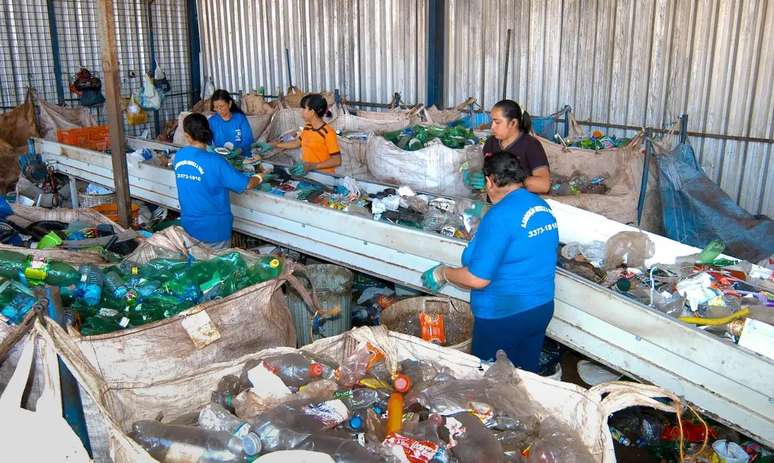According to the FDA, a problem can develop in the scar tissue around the implants, but it’s rare.
On Thursday 8, the Food and Drug Administration (FDA, an American agency similar to Anvisa) issued a warning for women who have breast implants or are considering getting them. According to the agency, some cancers can develop in the scar tissue that forms around implants.
These problems appear to be rare, but have been associated with implants of all types, including those with a textured or smooth surface and those filled with saline or silicone.
Scientists have previously linked an unusual tumor called anaplastic large cell lymphoma primarily to textured implants, whose rough outer surfaces allegedly cause more inflammation than smooth implants. Lymphoma is a tumor of the immune system.
Tests help identify early stage cancer Photo: REUTERS / Eric Gaillard
The FDA confirmed this link more than a decade ago, but the textured implants, made by Allergan, were on the market until 2019. The agency’s new notice drew attention to another cancer, called squamous cell carcinoma. as well as other types of lymphomas which can be related to implants.
There are few documented cases. The FDA said it is aware of fewer than 20 cases of cancer and fewer than 30 cases of unexpected lymphoma in the capsule around the breast implant. (The capsule is the scar tissue that builds up around the implant.)
Given the history of the implants and their widespread use, however, federal health officials felt the concern was justified. In some cases, women have been diagnosed after years of having breast implants. Symptoms included swelling, pain, swelling, and skin changes.
Although lymphomas and other cancers in the area around the implant may be rare, “Healthcare professionals and people who have or are considering breast implants should be aware that cases have been reported to the FDA and in the literature,” states the statement. .
Agency spokeswoman Audra Harrison said the new cancers are an “emerging safety signal that we are seeing with the implants we will communicate about, separate from the ALCL,” previously documented cancer.
But cases of lymphomas other than ALCL in women with breast implants have been reported in the scientific literature for about a decade, said Dr. Mark Clemens, professor of plastic surgery at the University of Texas MD Anderson Cancer Center in Houston.
They are rare, he added, and the new warning should not raise widespread alarm. Awareness that ALCL was linked to breast implants had already “allowed us to be more aware of what other things might be happening in that area,” Clemens said.
“If ALCL is rare, these are very rare,” he added. It has long been known that scar tissue, such as that resulting from breast implant surgery, can produce squamous cell carcinoma, I add.
“A wound that tries to heal, and tries to heal for a long time, can turn into these things,” he said. But the precise nature of the relationship between the implant and the cancer, and whether the implant is causing the cancer, is unclear, she said.
Last year, the FDA placed so-called black box labels on breast implants, warning they had been linked to a number of chronic medical conditions, including autoimmune diseases, joint pain, brain fog, muscle pain, and chronic fatigue, as well as to lymphoma.
Among the people most at risk of developing a later disease are breast cancer patients who have had or are planning to undergo chemotherapy or radiotherapy and who represent a large percentage of women who are encouraged to undergo breast reconstruction with prosthesis. Smokers and women who have lupus or diabetes are also at increased risk for complications, the FDA said.
One third of women who have breast implants will experience breast pain, breast tenderness, or loss of sensation or asymmetry. Half will experience painful hardening of scar tissue around the implant and a third will have implants that break or lose, the FDA said. Almost 60% will need another operation to fix the system problems.
On Thursday, the FDA said it was not recommending that women remove breast implants due to the new warning. But the agency advises women to monitor their implants and see a surgeon or healthcare professional if they notice any abnormal changes.
Textured implants made by Allergan were retired after nearly 600 cancer cases were linked to the implants and 33 deaths were attributed to the company’s devices. / TRANSLATION BY STÉPHANIE ARAÚJO, SPECIAL FOR ESTADÃO
Source: Terra
Benjamin Smith is a fashion journalist and author at Gossipify, known for his coverage of the latest fashion trends and industry insights. He writes about clothing, shoes, accessories, and runway shows, providing in-depth analysis and unique perspectives. He’s respected for his ability to spot emerging designers and trends, and for providing practical fashion advice to readers.







